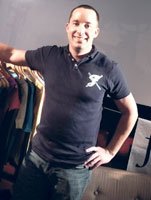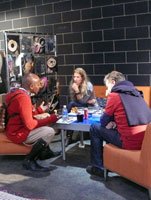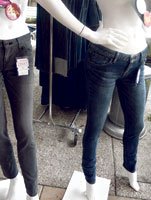Denim Brands Search for Value, Inspiration at Kingpins Show
Denim designers and manufacturers descended on the Kingpins trade show March 4–5 at the Smog Shoppe in Culver City, Calif., in search of something special. What that was depended on the brand, but value, novelty and provenance earned the most interest.
This was the biggest edition of Kingpins yet on the West Coast for the New York–based company, which produces two Kingpins shows per year in New York and two in Los Angeles. The boutique denim sourcing show featured 17 exhibitors, including Denim North America and Cone Denim, the last two denim mills in the United States. Brands such as Farmer, Agave, Monarchy, J Brand, Hurley, Brown Label, Goldsign, Vince, BCBG and Analog shopped the show for sources for their Spring 2010 offerings and finalized orders for Holiday 2009 collections.
With denim mills from the United States, South America, Japan, Hong Kong, Mexico and Morocco represented, designers had more fabric options than ever before—something that many found helpful as they look for ways to cut costs and add interest to their denim. Tavex Corp., Kurabo and Orta Anadolu rounded out Kingpins’ fabric-sourcing exhibitors.
Buxton Midyette, vice president of marketing for Supima, said denim designers could be focusing more on the provenance of their denim, not because of the cool factor but because of a renewed interest in things that are produced domestically. Brian Meck, vice president of sales and marketing for the vertical knits-maker Fessler USA, said designers are placing growing importance on “Made in the USA” for a couple reasons. “It’s getting to be a big deal because brands are producing as close to market as possible,” he said, adding that a domestic manufacturer like his has shorter lead times and can react more quickly for fill-in orders and replenishment programs than overseas manufacturers. The current political climate is also a factor for brands, he said. The cachet of a “Made in America” tag is more nebulous, he said, but no less motivating than price.
On the other hand, Rachid Maliki of Blue Fingers, New Wash and New Wash Services, a full-service denim manufacturer in Morocco, said some designers are turning to his company for more economical and duty-free denim production. “Price is a big issue. Designers want the same premium product at a cheaper price. A garment that is made in the United States for $45 costs $25 to $30 to make in Morocco,” Maliki said. Smaller brands that have trouble meeting minimum orders elsewhere took particular interest in Blue Fingers at Kingpins, he said.
At Tavex, Nicolai Glazer sold denim from mills in Morocco, South America and Mexico and noticed heightened levels of price sensitivity. The company, which made 120 million meters of fabric in 2008 and is the largest producer of denim in the world, saw an increased interest in denim produced in its Mexican factories. The denim produced in Mexico, Glazer said, costs between $3 and $3.50 per yard, while denim from its Moroccan mills can run up to $5.50 per yard. “Designers—who last season or last year wouldn’t look at the Mexican denim—are much more open to it now,” he said.
Regardless of provenance and price point, product is king, said Andrew Olah, chief executive of Olah Inc. and founder of the Kingpins show. “If you make something people like, they’ll buy it. If they already have it, then no price is low enough,” he said.
Jeanalogia, a Spanish garment-finishing company, unveiled its G2 technology, which washes cotton-based garments without water or chemicals. Using only oxygen and other gases, the G2 machine produces sun-faded effects and pigment looks. The machine eliminates the need for bleach and toxic chemicals and reduces the time and electricity needed in conventional color-reduction treatments, said Michelle Branch, Jeanalogia’s creative director. The company showed denim, knits and wovens treated with the G2 technology.
Copen Associates, a New York–based pocketing manufacturer, participated in Kingpins’ West Coast edition for the first time and showcased its made-to-order prints.
Kurabo Japan unveiled EarthDenim, a new specialty premium-denim fabric made from waste from the spinning, dyeing, weaving and cut-and-sew processes. The denim, which sells for $8 per yard, features a white core and super-dark-blue color due to its unique makeup. West Coast designers responded to stretch and rigid denim with a vintage look. Kurabo also debuted Spinair, a new 100 percent cotton yarn with a hollow core. Lighter than traditional cotton yarns, Spinair can be whipped into soft knits that retain the chunkiness of traditional cotton yarn but weigh less.
Basic Line Embroidery, Buhler Quality Yarns Corp., Apholos hardware, T-shirt maker Charitees, Los Angeles–based DenimTech laundry, Tag Trends label makers and Dow XLA completed Kingpins’ roster of brands.
David Sasso, vice president of sales for Buhler Quality Yarns Corp., exhibited at Kingpins for the first time. As a yarn producer, he said, the denim show isn’t about earning orders but rather supporting brands such as Fessler that use his yarn. “It’s good for designers to know where their fabrics come from, and being here allows us to explain the supply chain and build transparency,” Sasso said.
Dow Fiber Solutions returned to Kingpins with its XLA olefin-based elastic fiber. The company, which partners with various denim mills—including fellow Kingpins exhibitors Cone, Kurabo and Orta—touts the fiber’s benefit to the denim industry because of its resistance to the harsh chemicals and high heat often used to treat jeans. Brands such as Paige Premium Denim, AG, Goldsign and Citizens of Humanity use the XLA fiber.

























